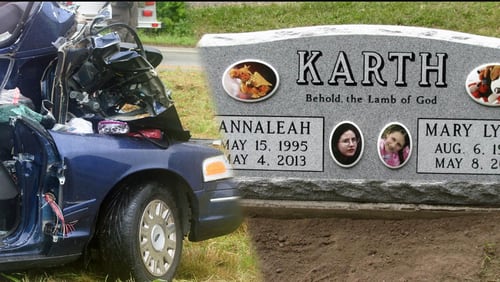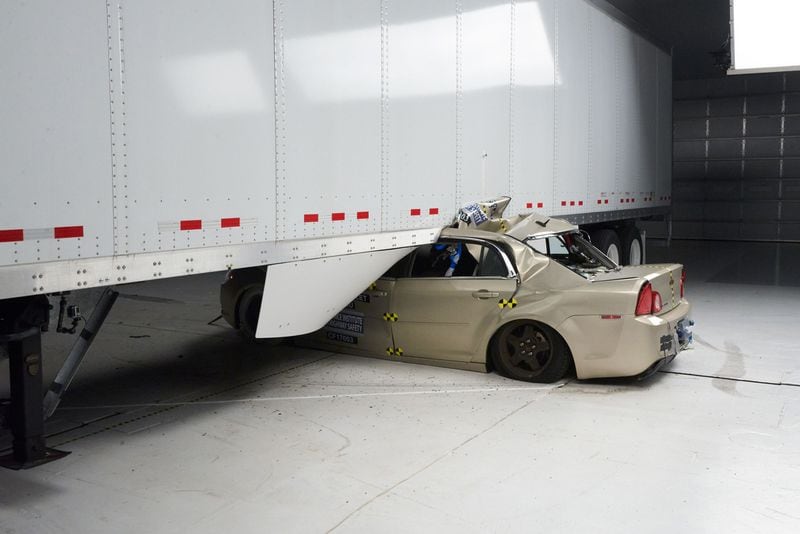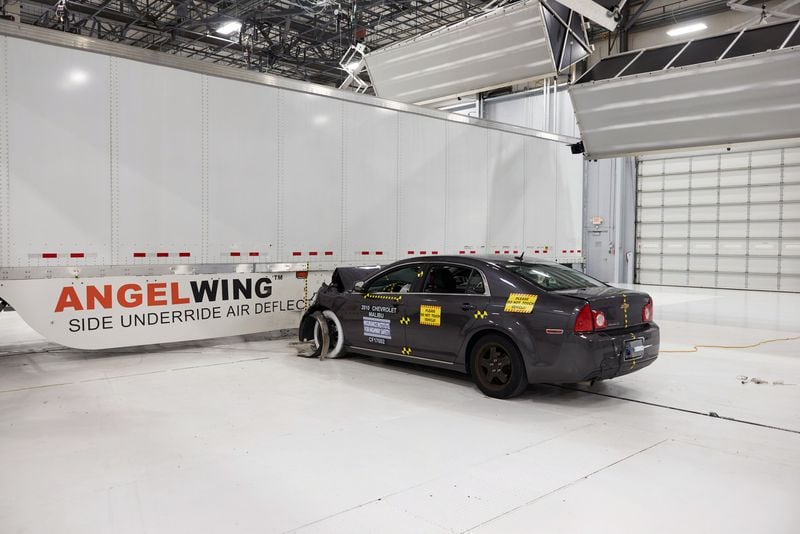Crash into the back of a tractor trailer, and an underride guard could mean the difference between a broken nose or having your head ripped off.
An underride guard is a steel, energy-absorbing bar that hangs off the back of a semitrailer, or along its sides, keeping cars from getting jammed underneath in a collision.
Credit: Johnny Edwards
Credit: Johnny Edwards
Without them, such wrecks typically shear the tops off cars. A side guard might have spared Hafiz Ilyas, who burned alive when his car got wedged under a Freightliner on I-85, as reported in this Atlanta Journal-Constitution interactive story on truck dangers.
But for decades, the trucking industry has resisted efforts to strengthen federal underride guard requirements for carriers. There are currently no mandates for side guards, and truckers can get away with having shoddy, rusted-out guards that give out in a crash, killing motorists.
One of the leading figures in the fight for tougher regulations – the resistance to the resistance – is a mother who lost two daughters in a 2013 crash in Georgia's Greene County, near I-20 exit 130.
Credit: Johnny Edwards
Credit: Johnny Edwards
At the time, the family was only passing through Georgia. Marianne Karth and her children were en route from their new home in Rocky Mount, N.C., to Arlington, Texas to celebrate four of her nine children's college graduations and her oldest daughter's wedding, according to a blog by a personal injury attorney.
Karth's daughters AnnaLeah, 17, and Mary, 13, were riding in the back seat of their Ford Crown Victoria when a tractor trailer sideswiped the car, spun it backward, then struck it again. The Karth's car plowed backward into the rear of another truck.
The second truck had a rear guard, but it gave way upon impact. The car's back seat was completely crushed. AnnaLeah died that day. Mary was hospitalized and died after several strokes.
"I wish it had been me instead of them," Marianne Karth told Washington D.C.'s WUSA 9. "It was so unexpected, so traumatic, so unnecessary, and I don't want it to happen to anyone else."
Karth and her husband have petitioned Congress, the U.S. Department of Transportation and trailer manufactures to improve underride guards and mandate new safety requirements. Here's a video from Karth's website, ForTruckSafety.com, about her daughters' deaths:
Crash tests by the Insurance Institute for Highway Safety have found that many underride guards in use by truckers won't prevent underride crashes, even at low speeds, which the Karth family tragically learned in Georgia.
The industry's fight against tougher rules goes back decades, ever since actress Jayne Mansfield died in a collision with the back end of a tractor-trailer. The guards became known as "Mansfield bars."
The battle rages on, even in the Trump era of deregulation and lessening corporate accountability.
Here's a rundown by WUSA 9:
In that proposal, the agency acknowledged its study found fatalities were still happening in rear end collisions with tractor trailers, despite high rates of seat belt use, air bags and other advanced safety features ...
The American Trucking Association said it supports the plan under consideration by NHTSA to strengthen rear guard requirements in the U.S. to a standard currently used in Canada. In fact, the Truck Trailer Manufacturers Association says 93 percent of the trailers being made today already have rear guards that meet that stronger Canadian standard.
The IIHS responded that's not good enough. Even the revised rules have huge holes, according to IIHS. For example, some non-trailer trucks would still be on the roads without rear guards. Meanwhile, trucking companies would be allowed to get rear guards approved without actual crash tests. Right now all trucking companies have to do is put stationary pressure at various points on the rear guard.
About the Author









